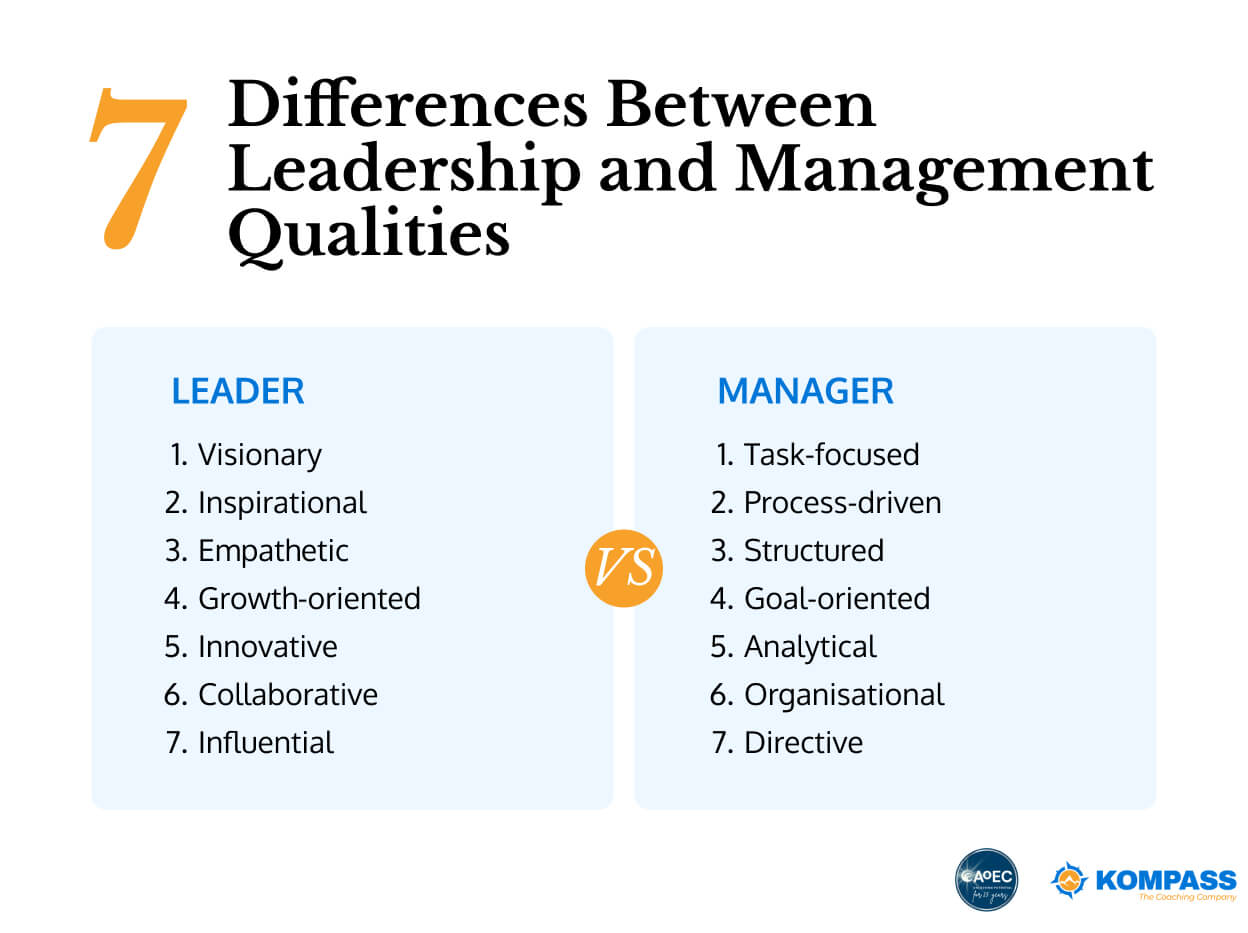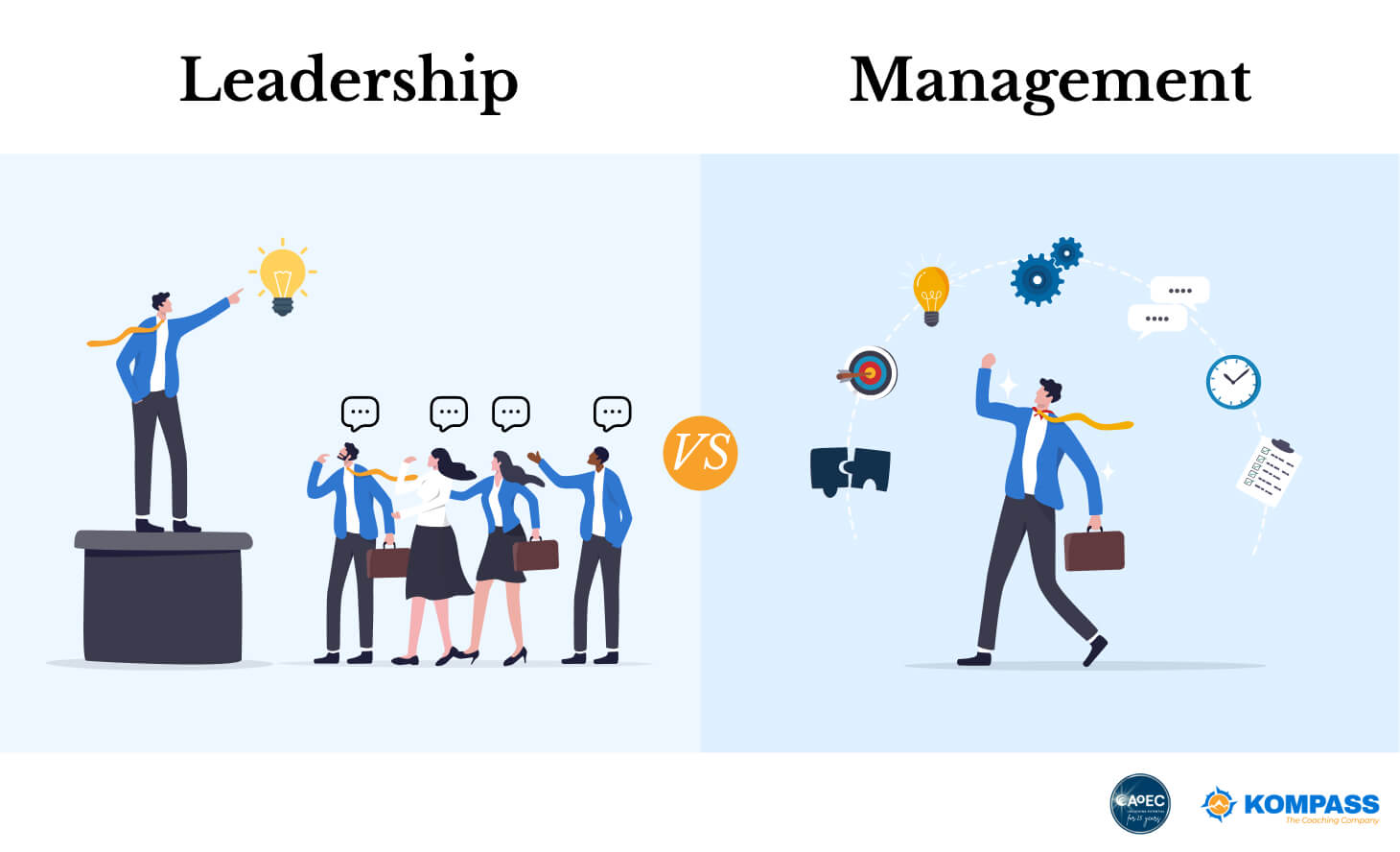Leadership and management may sound synonymous, but certain traits tell them apart. Both leaders and managers can take charge of teams and come up with strategies to meet the project goal. They are also equally essential in bolstering business and organisational growth. However, being a manager does not automatically make you a leader, while leaders are often managers in the workplace.
Managers supervise people, focus on tasks at hand, and implement processes to ensure productivity and efficiency. On the other hand, a leader can be a manager or a member of the team who can motivate those around them to do their best work and contribute to shared objectives.
Kompass Consultancy is a renowned coaching company in the UAE. We equip managers and unlock leadership potential through executive coaching. We’ve outlined the difference between leadership and management so you can decide for yourself what your organisation needs.

1. Quality vs. Role
Leadership is a set of skills and qualities, while management is a job position or role. Any individual or employee can have or develop leadership qualities such as being reliable, confident, innovative, and empathetic, as well as knowing how to delegate, communicate effectively, and discern tough choices. Ideally, managers are leaders who control and boost daily operations by inspiring individuals to strive for excellence and establishing team synergy.
Managers with leadership qualities can spot and nurture future leaders within their teams or departments. They’ll also be able to embody organisational values, create a positive environment, and foster a coaching culture in the workplace.
To explore how challenges shape leadership skills, consider reflecting on stories of resilience and success that demonstrate the transformational power of growth.
2. Vision vs. Goals
Leaders communicate a compelling vision of future growth and expansion that can be achieved through teamwork and how it can be beneficial for everyone involved. They illustrate a journey towards success and rally team members to be part of something great. Leaders engage employees by instilling purpose in their work.
Managers relay goals and set a standard of success. They coordinate plans, provide resources, staff people, and monitor progress.
3. Aligning vs. Organising
Managers accomplish goals by breaking them down into smaller or actionable steps and laying out tactical procedures for each objective. They organise teams to perform synchronised activities and match them with resources to attain the desired outcome.
Leaders go beyond task requirements, they align team members to complement each other’s strengths and weaknesses. Moreover, they identify possible opportunities and threats and then work towards delivering meaningful results through appreciative inquiry.
4. Challenges vs. Problems
Setbacks are inevitable, but it is your perception and what you choose to do about them that matters in the long run. Leaders view setbacks as challenges they can learn from, whereas managers may see them as problems or inconveniences that should be avoided.
Leaders challenge the issue by investigating what and why a certain process failed. Leadership builds resilience by truly understanding the mishap to find better alternatives to adapt to uncertainty or difficulty moving forward. Managers may simply ask how and when the problem occurred to propose an immediate solution that will enable the team to proceed to the next item on the to-do list as planned.
Consider how embracing struggles can lead to insights that fuel innovation. Lessons learned from such experiences often provide clarity and direction for overcoming future obstacles.
5. Nurtures Relationships vs. Reinforces Processes
Leadership nurtures relationships and genuine connections with people from all walks of life–upper management and stakeholders, colleagues and peers, employees, and clients or customers. Leaders promote inclusivity to provide equal opportunities and mutual trust and leverage diversity to spark innovation and change.
Management reinforces processes and structures that can guarantee efficiency. They utilise their in-depth analytical skills to make informed decisions and bonafide systems employees are expected to follow.
Focusing on how relationships shape workplace dynamics can offer valuable perspectives on trust, collaboration, and mutual growth.
6. Growth Mindset vs. Fixed Mindset
Leaders thrive with a growth mindset, while managers with a fixed mindset may feel limited or restricted by current abilities or situations. When something is not working, leaders reflect and are humble enough to seek out ways to clarify values and vision with everyone’s best interest at heart. They look for new perspectives that can expand their thinking.
Some managers may be deeply reliant on what is already tried and tested. They may stick to what they know and be driven to perfect existing skills.
To foster this mindset, it’s helpful to explore new ways of thinking that encourage openness to learning and evolving within professional and personal contexts.
7. Guides vs. Instructs
Leadership takes patience. It involves leading by example and guiding people to become independent, creative, and critical thinkers. Leaders encourage brainstorming sessions so team members can collaborate and take ownership of their original ideas. They trust in the competence of their team and do what they can to help them improve.
Management assigns tasks and instructs staff members on how to execute them. They concentrate on enacting predetermined protocols to minimise and mitigate risks.

Final Thoughts on the Key Difference Between Leader and Manager
The key difference between leader and managers is in the manner in which they get tasks done and how they contribute to the organisation’s success. Some people are born leaders, but anyone with the willingness to hone leadership skills and qualities can be a leader. Employees with leadership potential can be promoted to managers or hold executive positions. In the same way, managers can become more effective leaders when they seek new learnings or training to expand their skillset.
Leadership and management are both important to an organisation. You need leaders and managers to drive and navigate change. Leaders inspire and motivate individuals, and managers control situations and resolve conflict. Organisations that value their employee’s personal and professional development boost their competitive edge and industry advantage with active leadership and management in their workforce.
At Kompass Consultancy, we believe it is possible for individuals to possess leadership and management skills at the same time. We provide executive coaching to refine management skills by supplementing them with the necessary leadership skills or qualities that will enable them to harness team synergy.
Leader vs. Manager: What People Want to Know (FAQ)
1. What is the main difference between a leader and a manager?
A leader inspires and motivates people towards a vision, focusing on innovation and influence. A manager organises and directs people to achieve specific goals, ensuring operational efficiency and compliance.
2. Can a manager be a leader?
Yes, a manager can be a leader if they adopt leadership qualities such as empathy, vision, and the ability to inspire their team. However, not all managers naturally possess these traits, as leadership requires additional skills beyond task management.
3. Why is leadership considered a quality and management a role?
Leadership is a set of qualities like vision, empathy, and influence that anyone can develop regardless of their position. Management, on the other hand, is a defined role or title responsible for planning, organising, and supervising work.
4. Do organisations need both leaders and managers?
Yes, organisations need both. Leaders drive innovation and motivate teams to adapt to change, while managers maintain stability by ensuring that systems, resources, and processes are aligned to achieve goals.
5. How do leaders and managers handle challenges differently?
Leaders view challenges as opportunities for growth and learning, often encouraging their teams to innovate and think creatively. Managers focus on resolving challenges quickly to maintain workflow and achieve immediate goals.
6. What is the role of emotional intelligence in leadership vs. management?
Emotional intelligence is more critical for leaders as it helps them inspire, connect with, and motivate their teams. Managers rely more on technical and organisational skills, though emotional intelligence can enhance team communication and morale.
7. Is leadership more about influence than authority?
Yes, leadership relies on influence rather than formal authority. Leaders inspire people to follow them through trust and vision, whereas managers often rely on positional authority to enforce rules and delegate tasks.
8. Why do some people find it easier to manage than to lead?
Management involves structured processes like planning and organising, which are straightforward and often learnt through training. Leadership, however, requires softer skills like emotional intelligence, vision, and the ability to inspire, which are less tangible and harder to master.
9. Are leaders or managers more important during times of change?
Leaders are more important during times of change as they inspire teams to adapt and embrace new directions. However, managers are essential to implement the changes effectively by maintaining organisation and efficiency.
10. How can someone transition from being a manager to a leader?
To transition from manager to leader, one must develop qualities such as vision, empathy, and the ability to inspire others. This involves focusing less on tasks and more on people, building trust, and cultivating a forward-thinking mindset.







